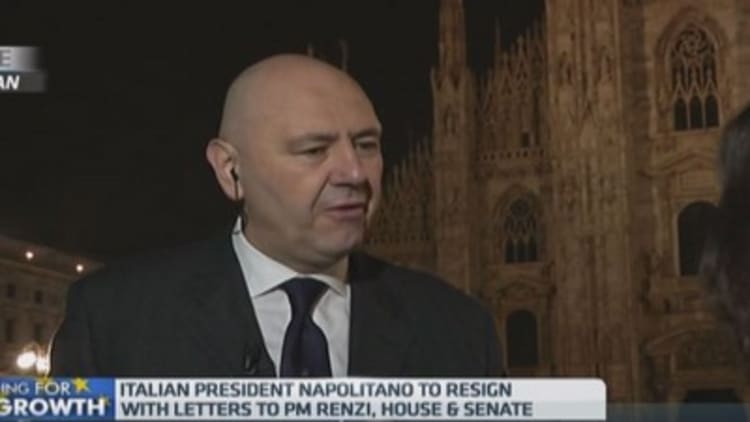As the elderly President of Italy, Giorgio Napolitano, finally enters retirement, European markets and politicians are watching to see whether there will be a smooth transition to a new head of state – and crucially, whether reforms will stay on track.
The 89-year old President Napolitano officially stepped down Wednesday morning and the voting to elect a new head of state will begin in a matter of weeks. But there are concerns that elections could herald more instability for Italy's fragmented political establishment.
In order to drive forward much-needed reforms, Italian Prime Minister Matteo Renzi needs a president who can unite politicians on both sides of the political spectrum, according to one Italian academic.
"We need someone that acts as a gatekeeper and not as a main player (in the political sphere)," Carlo Carnevale, professor of strategic and entrepreneurial management at the SDA Bocconi School of Management told CNBC in Milan Wednesday.

"This country needs somebody that can unite the country again, someone sympathetic and informal, someone not from the political elite. We expect some novelty from the proposals of candidates made in the next few days."
There are concerns that if the right person is not found, Italy could be plunged back into the political deadlock that has beset structural reforms up till now. Indeed, a political impasse after the country's 2013 general election coerced the outgoing President Napolitano to postpone his retirement and remain in the position, until now.
Carnevale said it was important that the new president was someone who didn't "interfere with the choices of parliament," but stressed that he didn't expect any "great struggles" over reforms.
Read MoreWhy Italy and investors are brushing off downgrade
Prime Minister Renzi appeared confident that reforms could be carried out before Napolitano's successor was elected, but there is a growing anti-political backlash in Italy, as seen elsewhere in Europe as voters become disaffected with the lack of change.
Carnevale warned that the current pace of reform was "very, very slow," and the European Commission -- which has given Italy some leeway on reforms in order for it to remain within -- would only allow Italy some slack if it saw positive economic results.
The blight on Italian politics
As Italy ended its six-month presidency of the European Union on Tuesday, Prime Minister Renzi told the European Parliament that the Italian economy was in considerable trouble, the ANSA news agency reported.
"The Italian economy is experiencing a period of terror and worry because of messages not only of austerity, but on terror and fear of the future," he said.
Read MoreS&P cuts Italy'srating to just above junk
Renzi, who leads a left-right coalition in government, added that a "derby" was currently being played out in Italy between those trying to turn the country around with reforms and those who bet that the reforms will fail. Political deadlock in Italy has been a bugbear of reform-minded politicians like Renzi and others before him.
Renzi was accused of attempting to "resuscitate" the career of disgraced politician and former Prime Minister Silvio Berlusconi by drafting tax reforms that could have seen Berlusconi's ban from public office revoked. Renzi needs the support of Berlusconi-led party Forza Italia in order to see through electoral reform.
The episode has not done Renzi's political standing much good, according to one Italian political analyst.
"Italy's recent political history has been plagued by failed attempts to keep bi-partisan governments united against the backdrop of a growing "anti-politics" mood," Franceso Galietti, head of the Rome-based Policy Sonar consultancy, said in a note this week.
"Renzi's cabinet has engaged in creative ambiguity and may now have stepped over the line into outright dissimulation; the economy remains in shambles; and the tides of anti-politics are not reversing. As a result, Renzi is now striving to consolidate his own grip on power before his popularity sinks too much and new political challengers emerge," Galietti said.
- By CNBC's Holly Ellyatt, follow her on Twitter @HollyEllyatt. Follow us on Twitter: @CNBCWorld


